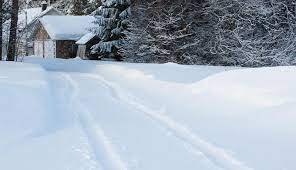Taking Care Of Your Driveway During Winter
Jul 25, 2021 13:59
We take special care of our yard during the winter months. But did you know, our driveway also requires special treatment as asphalt is naturally porous and can absorb ambient water! Once the water penetrates the cracks of our asphalt driveway and freezes in the winter months, the cracks can expand further.

This can cause deterioration in the driveway and shorten its service life significantly. Keeping such things in mind, we have collated a list of tips that can help maintain your driveway in good condition once the mercury shoots down.
• Routinely Remove Debris From Your Driveway
Debris should be immediately removed from the walkways and driveways. Apart from becoming a trip hazard on being covered by snow, they can even cause damage to snowblowers. The last thing you would want to deal with once the snow melts is a soggy newspaper and so it is always advisable to take preventive action.
• Use Ice Melt In Moderation
Extreme usage of ice melt can cause the driveways to become scaly and pocked. Vehicles pick up salt while traveling on the road and this salt drips eventually on the driveway especially in places where they remain parked. Clearing the excess ice melt can be a way out of this problem. It is best to avoid using deicers as they are extremely harsh on asphalt. But if you can’t do without it, then at least try to avoid rock salt which can be extremely damaging to asphalt. It also loses effectiveness once the temperature falls below 15-degree Fahrenheit. Magnesium Chloride can be a great substitute for rock salt in sub-zero temperatures. You can also opt for Calcium Magnesium Acetate which retains its efficiency even when the temperature dips to negative 25 degrees Fahrenheit.
• Repair The Driveway When Necessary
Putting off a repair will simply aggravate the problem in the long run. You can take the example of driveway cracks will tend to get bigger as water seeps inside and freezes. An asphalt tape can offer an immediate solution by repairing both joints and cracks in concrete and asphalt driveways. Natural events like frost heaves can damage your garage floor and the driveway.
• Stay Away From Metal Shovels
Metal shovels are infamous for damaging your asphalt driveway. This is why you need to stick to lightweight plastic shovels for removing snow from the driveway. It is advisable to shovel now and then to prevent the build-up of snow. You need to hold the shovel at a shallow angle to prevent driveway damage. Make sure not to use an ice pick or hold your shovel at a steep angle while digging into your driveway. Shoveling the snow before driving will make it easy to clear the same. Driving on the snow tends to pack it in, making it difficult to remove.
• Use A Push Broom Post Snowfall
Opt for a push broom to clean snow dust for getting a clean driveway without having to risk managing the same with a metal shovel.
• Choose A Snow Blower
Here comes another alternative to the traditional shovel. You can choose between electricity or gas-powered snow blowers for clearing your driveway in a time-efficient manner.
Final Words
Our home entrance is often overlooked when it comes to repair and maintenance. However, winter is especially tasking on asphalt given the routine snow and ice melting sessions. New driveways are more vulnerable and seal coating can guarantee protection for about 6 months. But throughout this time, you need to carry out smart maintenance for protecting your driveway. Levying a little attention to your driveway can go a long way in surviving the cold.







































































